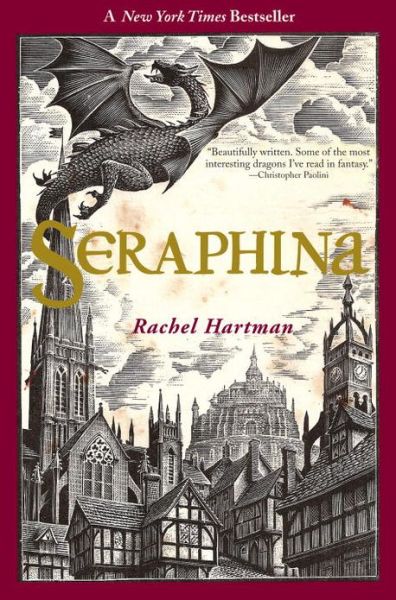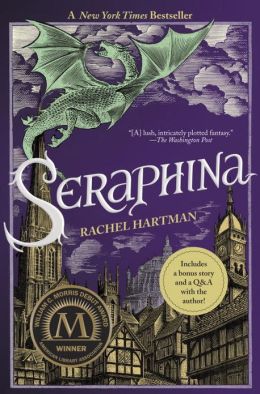Hartman, Rachel: Seraphina

Seraphina (2012)
Written by: Rachel Hartman
Genre: YA/ Fantasy
Pages: 512 (Hardcover)
Why I Read It: I was pretty suspicious of this title when it first came out. YA, dragons, meh. Not my thing. But when it comes to YA, I do like to wait and see what reviews have to offer in order to avoid hype or see if said reviews might change my mind. Reviews for Seraphina did, especially once people started talking about how it deserved to be nominated for Best Novel for the Hugo. I thought, okay, let's give this a shot, because if I like it, I might actually nominate it. So download it, I did! Let's see what Hartman has to offer, and whether or not it's really "YA" or if it's one of those books that would've easily been considered "adult" fantasy before the YA boom.
The premise: ganked from BN.com: In her New York Times bestselling debut, Rachel Hartman introduces mathematical dragons in an alternative-medieval world to fantasy and science-fiction readers of all ages. Eragon author Christopher Paolini calls them, "Some of the most interesting dragons I've read in fantasy."
Four decades of peace have done little to ease the mistrust between humans and dragons in the kingdom of Goredd. Folding themselves into human shape, dragons attend court as ambassadors, and lend their rational, mathematical minds to universities as scholars and teachers. As the treaty's anniversary draws near, however, tensions are high.
Seraphina Dombegh has reason to fear both sides. An unusually gifted musician, she joins the court just as a member of the royal family is murdered -- in suspiciously draconian fashion. Seraphina is drawn into the investigation, partnering with the captain of the Queen's Guard, the dangerously perceptive Prince Lucian Kiggs. While they begin to uncover hints of a sinister plot to destroy the peace, Seraphina struggles to protect her own secret, the secret behind her musical gift, one so terrible that its discovery could mean her very life.
Winner of the 2013 William C. Morris YA Debut Award
Spoilers, yay or nay?: Nay. If you haven't yet read the book and you're in a hurry, please skip down to "My Rating" and you should be in good shape. Everyone else, onward!

Discussion: The start of the book was both promising and not. I really liked the narrative voice, and the writing drew me in rather quickly. Except for a thing:
The misuse of words.
Rather, what I'm pretty SURE are the misuse of words.
This isn't wholly a chronic issue. When the book opens, we get this (emphasis mine) in the very first paragraph:
I remember being born.
In fact, I remember a time before that. There was no light, but there was music: joints creaking, blood rushing, the heart's staccato lullaby, a rich symphony of indigestion. Sound enfolded me, and I was safe.
Now, the author may have very well meant the word "indigestion." However, consider the other descriptions used, descriptions that are constant. Digestion itself would be somewhat constant. Certainly more constant than indigestion, which is rather painful and infrequent unless you're my husband or grandmother, in which case everything and anything you eat and drink, including water, will make you miserable. But there's a part of me that really thinks that author meant digestion over indigestion, and I'm rather sad no one caught that. I can understand why they didn't: it's quite a lovely opening paragraph, and it just sort of picks you up and carries you along. I almost got carried along myself, but my brain was having fits, so I had to discover why.
This is why.
Then there's what appears to be a more chronic misuse: courtesy over curtsy. This book is littered with half and full courtesies, and there's a curtsy or two slid in as well. I started getting befuddled, wondering if it wasn't a very bad spelling error that PEOPLE SHOULD HAVE CAUGHT, but rather, maybe I'm the one missing something? Maybe a "courtesy" is a form of acknowledgement, a term that no longer applicable today and unknown unless you read historical settings? Or perhaps it's a made-up thing by the author, much like Daniel Abraham's poses in The Long Price Quartet, but those get very vivid description, so that even if the reader can't visualize what's happening, the reader is fully aware that these gestures are an important and deliberate form of communication.
So, deliberate or misspelling of the word "curtsy"? Dictionary.com states that the fifth definition of "courtesy" is an actual curtsy, so I suppose it's deliberate. But it's not consistently used in the book (like I said, curtsy does slip in here and there) and it begs the question: why use it over a term people are more familiar with? Stylistic choice, I guess, but a suspicious one in my eyes. It made me want to second-guess some of the author's other word choices, and it reinforced my notion that "indigestion" was a mistake.
If I have any gripes about this book, that's it.
Because short of those questionable word choices, the writing really got to me. Page 34:
When I was eleven, my father and I came to a crisis. I found my mother's flute hidden in an upstairs room. Papa had forbidden my tutors to teach me music, but he had not explicitly stated that I was not to teach myself. I was half lawyer; I always noticed the loopholes.
The world-building also really caught my eye. Seraphina's expertise as a musician was familiar to me as a music major. While I never played an instrument (I was vocal performance), I could relate to all of the troubles she had with her profession, everything from dealing with difficult bosses to various musicians. Oh, this was a familiar world to me, one I don't often see in fantasy, so it was fun to see here. I also loved the division between humans and dragons: that dragons are very, well, Vulcan-like, and because they aren't emotional unless they're in human form, are fascinated yet perplexed by art. The idea that the longer a dragon stayed in human form without having their brains excised was utterly fascinating, as we saw the consequences of what would happen, both in the past and in the present. Seraphina's mother's love for Claude, Seraphina's father. Orma's attachment to his niece. Even the Ardmagar's onslaught of emotions as he comes down to celebrate the peace treaty. It's a fascinating study, and we're given a fascinating POV: someone who's both human and dragon. Someone who can empathize with both sides.
I said I'd talk about how this feels like a fantasy that would've been published as "adult" fantasy before the YA boom was in effect. I stand by that. Admittedly, the heroine is rather young, and there is a kind of love story (not a traditional one, by any means), but the book and the world-building feels so complete. I was reminded in some ways of Robin Hobb's Assassin's Apprentice, probably because it is a coming-of-age story and because it's a secondary-world fantasy told from a first person POV. I won't say that having the YA label necessarily does this book a disservice: this is a great way to get younger readers initiated into secondary world fantasy. However, if anyone dismissed this book BECAUSE it's marketed as YA, then you're missing out. You're really, really missing out.
Yes, there's a bit of a love story, but it's not freaking Twilight. It operates within the constraints of the world, and its resolution, such as it is, is a very mature, obvious solution (I just hope those mature decisions carry out appropriately as the story continues). And the world-building itself… I won't spoil anything, but Seraphina's garden is a lovely thing of beauty. Her relationship with Ormas, wonderful, and the relationship she builds with the Ardmagar is fascinating. Then there's little details, like how this culture wears white instead of black for mourning. And I loved how, story-wise, I thought I knew what was going on, and yet Hartman managed to surprise me completely.
My Rating: 9 - Couldn't Put It Down
This book was an utterly fast and fascinating read, and the author often surprised me with various revelations. I was so sure I knew how things would turn out, and then as I read on, I'd discover I was oh-so-wrong. It's a solid book with Seraphina, our heroine, learning how to accept herself as well as the friends she has, and Hartman has built quite the likable cast, yet they're very fragile. Various revelations could tear the friendships apart, and I hope that ends up not being the case, because these characters feel right for their ages in that particular time. No gibbering teenage nonsense: these characters might not be adults by today's standards, but they are by historical standards, and Hartman handles that line very, very well. It's a wonderful book, and it's one I'll seriously consider for the Hugo. I'm not sure if Hartman is eligible for the John W. Campbell Award for New Writers, but if she is? She totally deserves a nod there too.
Cover Commentary: I'm torn. I really love the simplicity, almost old-timey feel to the original cover (seen at the top). The art itself is really intricate. But the new cover (seen behind the cut) which takes the same art but colors it? So pretty! I love the colors, and the font, as well as placement of the title and author's name. So yeah, both are gorgeous, and wonderfully eye-catching.
Next up: Wide Open by Deborah Coates